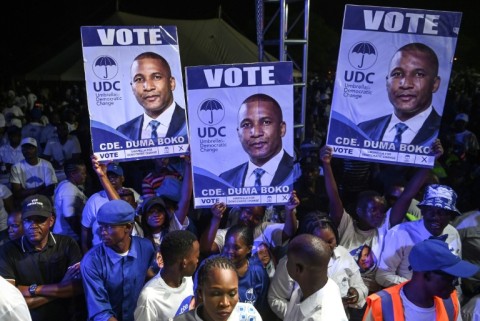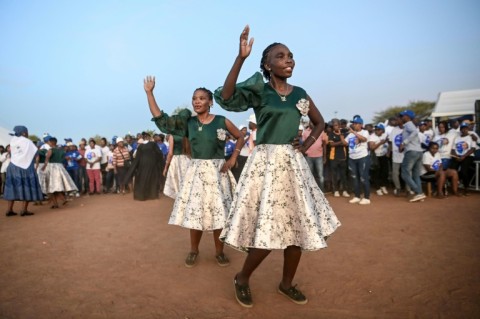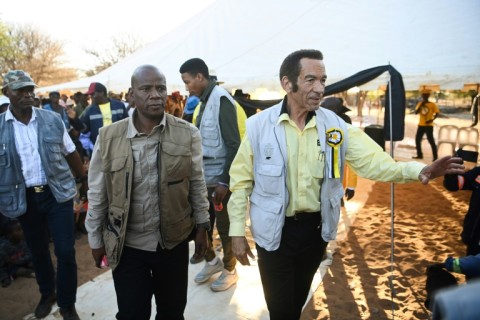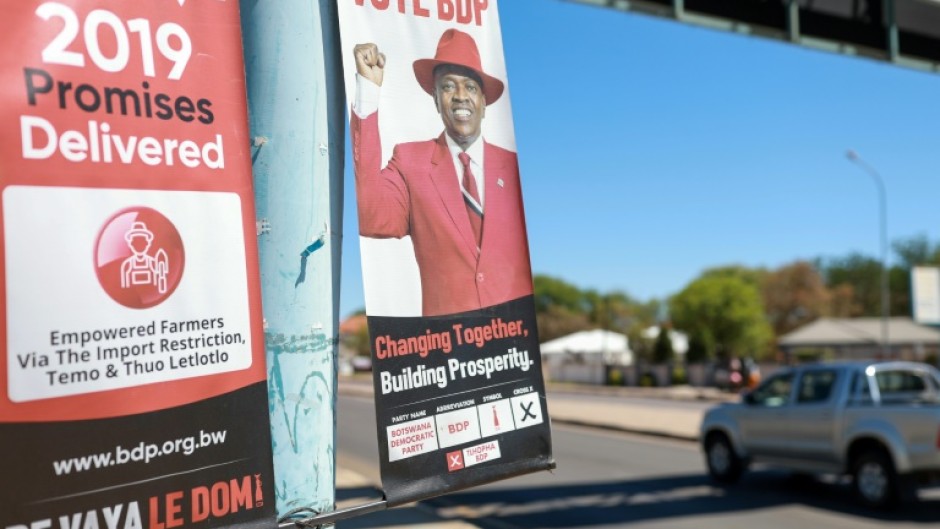GABORONE - The red of Botswana's ruling party colours dominated a modest spread of campaign posters in the capital on Tuesday as parties prepared for final rallies on the eve of elections.
A few posters for the blue-themed opposition Umbrella for Democratic Change (UDC) could be seen around the university, a bastion of support for the left-leaning alliance among three main groups challenging the party in power for 58 years in Wednesday's vote.
But the Botswana Democratic Party (BDP) of President Mokgweetsi Masisi, 63, was most visible in Gaborone.
More than 300 people gathered for the final BDP rally in Gaborone late on Tuesday, with everyone decked out in the colours of the party and dancing under the night sky to welcome Masisi.
"In 2019, we had a clean sweep of Gaborone. This year, I want to polish," Masisi told his cheering supporters.
In the crowd was Queen Mosiane, 34, who said the outfit had her loyalty because its systems had supported her when she became an orphan as a young girl -- education and healthcare are covered by the state in Botswana.
On the criticism of Masisi, she said, "everyone deserves a second chance."
Among people wearing red hard hats marked 'unbreakable', was civil servant Refile Kutlwano, 34.
"The opposition is not ready to rule," she said.

However, many Gaborone residents expressed hope for change in the diamond-rich and largely desert country of only 2.6 million people.
"Since our independence, we've been ruled by the same people, with the same mindset, with the same goals," Ookeditse Letshwenyo said.
Hopes that the UDC would bring change were dashed when its two main partners –- the Botswana Congress Party (BCP) and the Botswana Patriotic Front (BPF) -- quit in the lead-up to the vote to field their own presidential candidates, said Letshwenyo, who is self-employed.
"You can't win BDP while you are divided," he added.
The BDP has held power since independence from Britain in 1966, when Botswana established a democratic system that is the oldest in southern Africa.
It won 52 percent of votes in the 2019 election, giving Masisi a first term that critics say has been marked by mismanagement amid a downturn in the diamond-dependent economy.
Economic growth is projected to slow to one percent in 2024, from 2.7 percent last year, according to the World Bank.
Unemployment is around 27 percent, rising to 38 percent among young people.
- 'Historical momentum'-
Waitress Sharon Setshwantsho said she would vote for change that would bring jobs to Botswana's youth.
"We have certificates, we went to school, but we're on the streets," she said.

Some young people said, however, that they felt sidelined in the testy lead-up to election day.
"The campaigns haven't given me a reason to want to vote," said finance student Mpho Keorapetse, who has not registered to cast her ballot.
"No one has been saying anything of essence for the past few months or for the past year."
Pastor Masego Moleje also believes the UDC holds the key to change.
The party's leader, 54-year-old Duma Boko, "is very concerned about the nation, not about himself," she said.
"They want to create jobs for us and for our children."
Dominating election coverage on Botswana's only news channel, the state-run BTV, the ruling party is reported to have stronger support outside of the capital.
While it may lose its sweep of all the Gaborone constituencies, with its "historical momentum and the limping opposition, the BDP's path to victory appears not only likely but increasingly evident", the independent Mmegi newspaper said.

The campaign has been shaken up by the previous president Ian Khama's energetic electioneering, with the 71-year-old vowing to undo his "mistake" in handpicking Masisi as his successor in 2018.
Khama principally supports the BPF, founded by supporters when he dramatically quit the ruling party just months after Masisi took over as president.
As his feud with Masisi deepened, Khama fled to South Africa in 2021, returning six weeks ago.
Khama's efforts at discrediting Masisi may have boosted the opposition in certain districts but his impact is expected to be limited, analysts said.
"I think he should just let things go, let other parties win, not try to influence anything," said Bokomoso Fetlhalefile, 25, a salesperson.
Voters will choose parties in national and constituency ballots in a first-past-the-post system that requires only the largest number of seats to win, rather than 50 percent.
The party with the most MPs in parliament will form a government headed by the presidential candidate.
- by Bronwen Roberts

